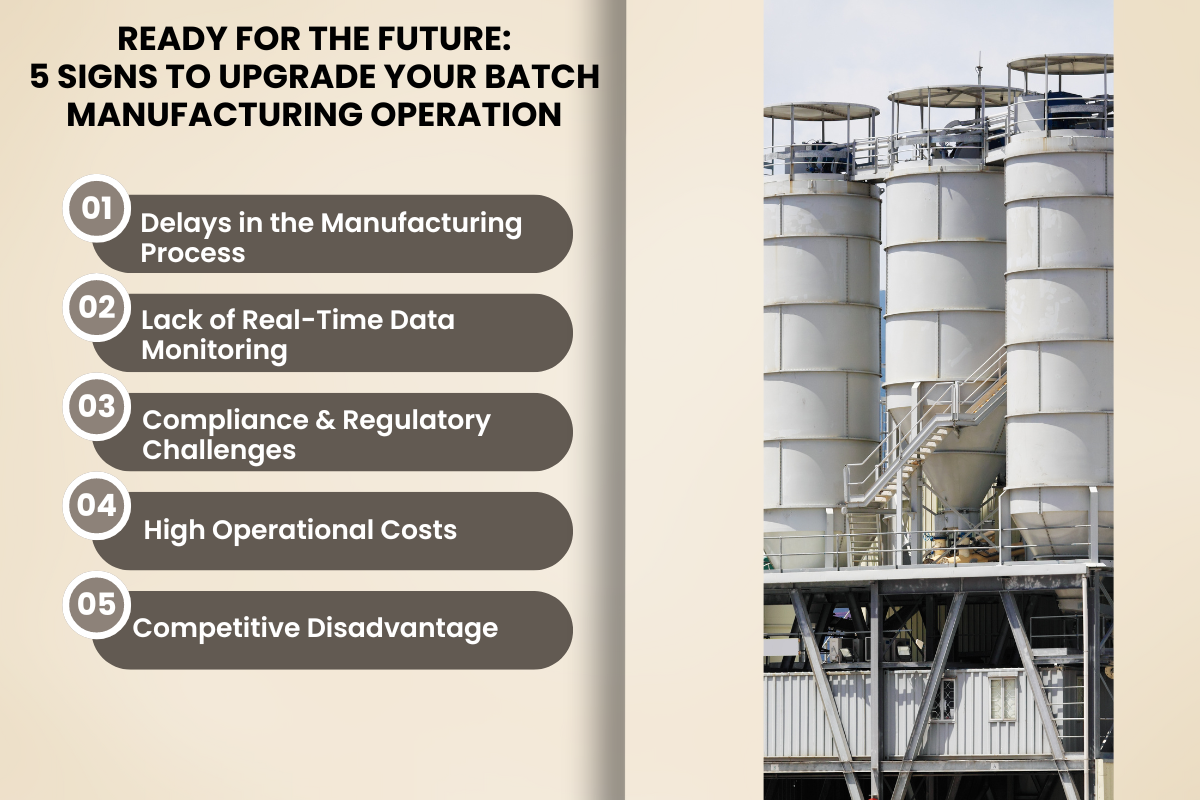Introduction to Batch Manufacturing Operation
Batch manufacturing has long been the backbone of many industries, from pharmaceuticals to food processing. It allows for efficient production of goods in predetermined quantities, ensuring consistency and quality. However, in today’s fast-paced and technologically advanced world, it’s crucial for businesses to stay ahead of the curve. Let’s explore the signs that indicate it’s time to modernize your batch manufacturing operation and discuss the benefits of doing so.
5 Signs It’s Time for a Modern Upgrade of the Batch Manufacturing Operation

Sign 1: Inefficiencies and Delays in the Batch Manufacturing Process
One of the clearest signs that your batch manufacturing operation needs a modern upgrade is if you’re experiencing inefficiencies and delays in the production process. This could be due to outdated equipment, manual data entry, or a lack of automation. These inefficiencies not only slow down production but also increase the risk of errors and quality issues. By investing in modern technologies and equipment, you can streamline your batch manufacturing process, reduce downtime, and improve overall efficiency.
Sign 2: Lack of Real-Time Data Monitoring and Analysis
In today’s data-driven world, having access to real-time data is essential for making informed decisions and optimizing production. If your batch manufacturing operation lacks the ability to monitor and analyze data in real-time, it’s a sign that you need a modern upgrade. Implementing advanced data analytics and visualization tools can provide valuable insights into your production process, enabling you to identify bottlenecks, optimize workflows, and improve overall productivity.
Sign 3: Compliance and Regulatory Challenges
Compliance with industry regulations and standards is crucial for batch manufacturing operations, especially in highly regulated sectors such as pharmaceuticals. If your current manufacturing processes make it difficult to meet compliance requirements, it’s a clear indication that it’s time for a modern upgrade. Electronic batch manufacturing records (eBMR) can help streamline compliance by providing a digital, traceable record of each batch’s production history. By implementing eBMR, you can ensure compliance, reduce the risk of errors, and simplify the auditing process.
Sign 4: High Operational Costs
Outdated batch manufacturing processes can result in high operational costs, including labour, energy, and material expenses. If you find that your operational costs are escalating, it’s a sign that you need to explore cost-effective alternatives. Modernizing your batch manufacturing operation can help reduce costs through automation, optimization of workflows, and improved resource utilization. By investing in energy-efficient equipment and implementing lean manufacturing principles, you can achieve significant cost savings in the long run.
Sign 5: Competitive Disadvantage
If your competitors have already upgraded their batch manufacturing operations and you’re still relying on outdated processes, it’s a clear sign that you’re at a competitive disadvantage. Modernizing your batch manufacturing operation can give you a competitive edge by enabling faster production cycles, higher quality products, and greater flexibility in meeting customer demands. By embracing modern technologies, you can position your business as an industry leader and stay ahead of the competition.
How can the Batch Manufacturing Process be Improved?
Modernizing your batch manufacturing process requires a strategic approach and careful consideration of various factors. Here are some key steps you can take to improve your batch manufacturing process:

Step 1: Conduct a Comprehensive Process Audit
Start by conducting a comprehensive audit of your current batch manufacturing process. Identify bottlenecks, inefficiencies, and areas for improvement. This will provide you with a clear understanding of the specific challenges you need to address.
Step 2: Invest in Automation and Robotics
Automation and robotics can significantly improve the efficiency and accuracy of your batch manufacturing process. Consider investing in automated equipment, such as robotic arms or process control systems, to streamline production and reduce the risk of errors.
Step 3: Implement Real-Time Process Monitoring
Real-time process monitoring allows you to track and analyze key performance indicators (KPIs) in real-time. This enables you to identify and address issues as they arise, improving overall productivity and quality.
Step 4: Embrace Digitalization and Paperless Production
Transitioning to electronic batch manufacturing records (eBMR) can eliminate the need for manual data entry and paperwork, reducing the risk of errors and improving traceability. Embrace digitalization and implement software solutions that enable paperless production.
Step 5: Continuous Improvement and Optimization
Batch manufacturing processes can always be improved. Foster a culture of continuous improvement and optimization by regularly reviewing and analyzing production data, implementing feedback loops, and seeking ways to further streamline your operations.
The Role of Electronic Batch Manufacturing Records (eBMR)
Electronic batch manufacturing records (eBMR) play a crucial role in modernizing batch manufacturing operations. They provide a digital record of each batch’s production history, including key process parameters, raw material information, and quality control data. This digital record improves traceability, simplifies compliance, and reduces the risk of errors associated with manual data entry. eBMR also enables real-time monitoring and analysis of production data, allowing for proactive decision-making and optimization of workflows.
Embracing the Future of Batch Manufacturing
In conclusion, the signs that it’s time to modernize your batch manufacturing operation are clear: inefficiencies, lack of real-time data monitoring, compliance challenges, high operational costs, and competitive disadvantage. By investing in automation, data analytics, and digitalization, you can revolutionize your batch manufacturing process. Implementing electronic batch manufacturing records (eBMR) and embracing cost-effective practices can further enhance efficiency and compliance. Don’t let your business fall behind; embrace the future of batch manufacturing and stay ahead of the competition.











